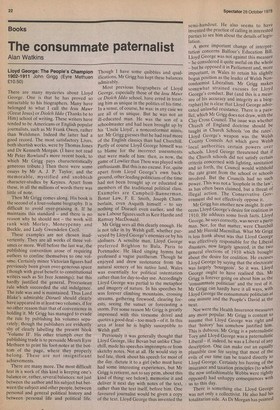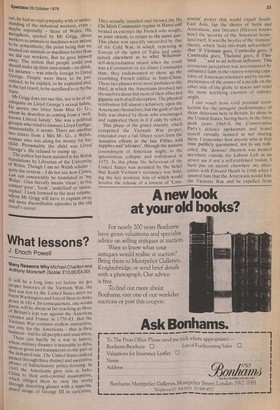Books
The consummate paternalist
Alan Watkins
Lloyd George: The People's Champion 1902-1911 John Grigg (Eyre Methuen £10.50) There are many mysteries about Lloyd George. One is that he has proved so intractable to his biographers. Many have belonged to what I call the lesu Mawr (Great Jesus) or Diokh Iddo (Thanks be to Him) school of writing. These writers have tended to be Americans or English popular journalists, such as Mr Frank Owen, rather than Welshmen. Indeed the latter had a good record. The most satisfactory Lives, both shortish works, were by Thomas Jones and Dr Kenneth Morgan. (I have not read Mr Peter Rowland's more recent book, to which Mr Grigg pays characteristically generous tribute.) Then there were some essays by Mr A. J. P. Taylor; and the memorable, mystified and snobbish character-studies by Keynes. Apart from these, in all the millions of words there was little of note.
Then Mr Grigg comes along. His book is the second of a four-volume biography. It is difficult to avoid over-praising it. If he maintains this standard — and there is no reason why he should not — the work will rank with Morley, Moneypenny and Buckle, and Lady Gwendolen Cecil.
These examples are not chosen inadvertently. They are all works of three volumes or more. Well before the last war, the publishing convention arose of requiring authors to confine themselves to one volume. Certainly minor Victorian figures had previously been given over-generous space (though with great benefit to constitutional writers such as Sir Ivor Jennings): but this hardly fustified the general, Procrustean rule which succeeded the old indulgence. The rule was and is maintained. Thus Lord Blake's admirable Disraeli should clearly have appeared in at least two volumes, if for no other reason than that of convenience in holding it. Mr Grigg has managed to evade the rule by publishing his volumes separately; though the publishers are evidently shy of clearly labelling the present book 'Volume II'. His other triumph over the publishing trade is to persuade Messrs Eyre Methuen to print his foot-notes at the bottom of the page, where they properly belong. These are not insignificant achievements.
There are many more. The most difficult feat in a work of this kind is keeping one's balance or, rather, several balances: not just between the author and his subject but between the subject and other people, between personal and general political history and between personal life and political life. Though I have some quibbles and qualifications, Mr Grigg has kept these balances admirably.
Most previous biographers of Lloyd George, especially those of the Iesu Mawr or Diokh Iddo school, have erred in treating him as unique in the politics of his time. In a sense, of course, he was: in any case we are all of us unique. But he was not an ill-educated man. He was the son of a schoolmaster and had been brought up by his 'Uncle Lloyd', a nonconformist minism ter. Mr Grigg guesses that he had read more of the English classics than had Churchill. Partly of course Lloya George himself was to blame for the incorrect assessments that were made of him: then, as now, the game of Lowlier than Thou was played with enthusiasm. But this is no excuse. For, quite apart from Lloyd George's own background, other leading politicians of the time had not been brought up or educated as members of the traditional political class. Examples are Campbell-Bannerman, Bonar Law, F. E. Smith, Joseph Chamberlain, even Asquith himself — to say nothing of Disraeli even earlier, and the new Labour figures such as Keir Hardie and Ramsay MacDonald.
Mr Grigg sees all this clearly enough. He is not take in by Welsh guff, whether purveyed by Lloyd George's enemies or by his idolisers. A sensible man, Lloyd George preferred Brighton to Bala, Paris to Portmadoc. He liked singing hymns but professed a vague pantheism. Though he enjoyed and drew sustenance from the natural scenery of his native land, Wales was essentially for political ostentation rather than for day-to-day use. Accordingly Lloyd George was partial to the metaphor and imagery of nature. In his speeches he was forever climbing mountains, crossing streams, gathering firewood, clearing forests, seeing the sunset or forecasting a storm. For some reason Mr Grigg is greatly impressed with this tiresome drivel and quotes a good deal — too much — of it. In this area at least he is highly susceptible to Welsh guff.
Previously it was generally thought that Lloyd George, like Bevan but unlike Chur chill, made his speeches impromptu or from sketchy notes. Not at all. He would stay in bed late, think about his speech for most of the day. dictate it to a girl (who must have had some interesting experiences, but Mr Grigg is reticent, not to say prim, about this kind of thing: see below), memorise it and deliver it next day with notes of the text, rather than the text itself, before him. One favoured journalist would be given a copy of the text. Lloyd George thus invented the semi-handout. He also seems to have invented the practice of calling in interested parties to see him about the details of legislation.
A more important change of interpretation concerns Balfour's Education Bill. Lloyd George was not against this measure — he considered it quite useful on the whole — but he opposed it in Parliament and, more important, in Wales to retain his slightly bogus position as the leader of Welsh Nonconformist Liberalism. Mr Grigg makes somewhat strained excuses for Lloyd George's conduct. But (and this is a measure of his accuracy and integrity as a biographer) he is clear that Lloyd George advocated unlawful resistance. There is a parallel, which Mr Grigg does not draw, with the Clay Cross Council. The issue was whether Church of England doctrine should be taught in Church Schools 'on the rates'. Lloyd George's weapon was the Welsh C Councils Act which gave Welsh local al authorities certain powers over schools. Lloyd George threatened that if the Church schools did not satisfy certain criteria concerned with lighting, sanitation and so forth, the Council would withhold the rate grant from the school or schools involved. But the Councils had no such power. This was not a 'loophole in the law', as has often been claimed, but a threat of illegal action. The 'Conservative Government did not effectively oppose it.
Mr Grigg has another new insight. It concerns Lloyd George's desire for coalition in 1910. He adduces some fresh facts. Lloyd George, e says correctly, was never a party man. g' Nor, for that matter, were Churchill and Mr Harold Macmillan. What Mr Grigg is less frank about was that Lloyd George was effectively responsible for the Liberal disasters, now largely ignored, in the two general elections of 1910 which brought about the desire for coalition. He excuses Lloyd George by saying that the electorate was largely 'bourgeois'. So it was. Lloyd George ought to have realised this. Mr Gria is forever going on about him as the 'consummate politician' and the rest of it. Mr Griggcan hardly have it all ways, with Lloyd George the consummate politician at one minute and the People's David at the next.
Nor were the Health Insurance measures any more popular. Mr Grigg is content to assume that Lloyd George was right and that 'history' has somehow justified hinl. This is dubious. Mr Grigg is a paternalistic Tory and Lloyd George was a paternalistic Liberal — if, indeed, he was a Liberal of any description. One can make out an equally plausible case for saying that most of the evils of our time can be traced directly to Lloyd George. Certainly his fuzzing of the insurance and taxation principles (to which the novv unfashionable Webbs were rightly opposed) had unhappy consequences with us to this day.
There is something else. Lloyd George was not only a collectivist. He also had his totalitarian side. As Dr Morgan has pointed out, he had no real sympathy with or understanding of the industrial workers, even T maybe especially — those of Wales. His metaphors, quoted by Mr Grigg, about workers as animals or machines were meant to be sympathetic; the point being that we treated our animals or machines better than we did our workers. But he gave himself away. The notion that people could and should make up their own minds—on drink, for instance — was utterly foreign to Lloyd George. People were there to be patronised, to be cajoled, to be exploited and, in the last resort, to be sacrificed to or by the State.
Mr-Grigg does not see this, nor is he at all adequate on Lloyd George's sexual habits. He quotes one letter from Miss G— 0—, Whom he describes as coming from a 'wellknown Liberal family'. She was a political groupie who tried to ensnareLloyd George; unsucessfully, it seems. There are another two letters from a Mrs M— G—, a Welshwoman who was aking for money for her Child. Presumably the child was Lloyd George's. He refused to stump up. The author has been assisted in his Welsh translations by Librarian of the University of Wales. Though I am no Welsh scholar — quite the reverse — I do not see how Cymru Lan can conceivably be translated as 'my Wales'. Glatt literally means 'clean'; in this context 'pure', 'fresh', 'undefiled' or 'uncorrupted'. I look forward to the next volume, Where Mr Grigg will have to explain away Still more discreditable episodes in the old rascal's career.







































 Previous page
Previous page